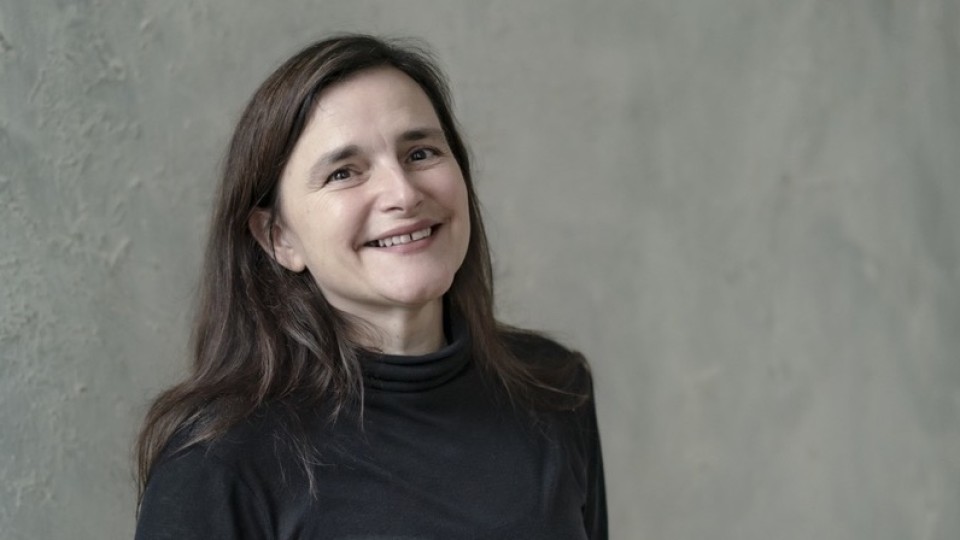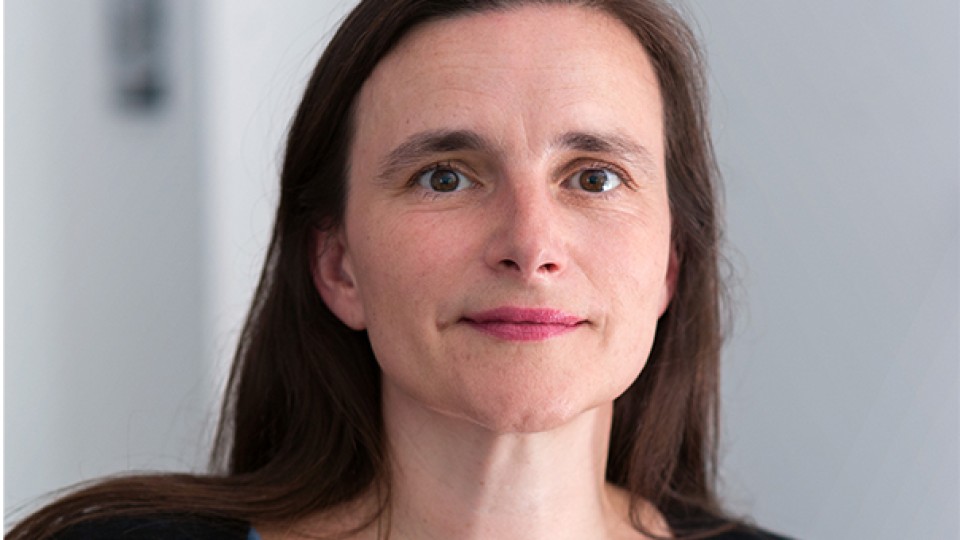Nordrand, shown in competition for the Golden Lion at the 1999 Venice Film Festival, is considered a milestone. It marked the beginning
of growing international appreciation of Austrian filmmaking, but above all it launched Barbara Albert's career as a director,
screenwriter, producer and teacher. After ten years at the Film University of Babelsberg, where she was most recently Vice
President for Academic Affairs, and 32 years after she herself began her studies in directing and screenwriting at the Vienna
Film Academy, she returns there to succeed Michael Haneke as Professor of Directing.
Can you still remember what you expected from your studies at the Film Academy when you were accepted there?
BARBARA ALBERT: I was allowed to audit courses the year before I enrolled, and that year was important in giving me some idea of what filmmaking
actually meant. The fact that I passed the entrance exam was so overwhelming that I honestly didn’t have any expectations;
I was just happy to have been admitted and finally be able to think and write films, talk about films, develop characters,
shoot small exercises, just do my things.
What was it like to study directing and screenwriting in the 90s?
BARBARA ALBERT: Then, as now, for the first three semesters all students got a grounding in all subjects: something which isn’t available
to the same extent at other film schools. In the screenwriting class with Walter Wippersberg, we exchanged a lot of ideas
about our scripts within the class. Those were fine sessions. The course had a very practical orientation. When I started,
there was the Axel Corti class, which later became the Michael Haneke and Wolfgang Glück class; I was in the Lukas Stepanik/Peter
Patzak class. To be honest, that didn't have much influence on me: I hardly saw the professors. One exception at the beginning
of my studies was Lukas Stepanik. The directing group included Antonin Svoboda, Valentin Hitz, Chris Krikellis, Jessica Hausner
and me. We helped each other and exchanged ideas, which was very productive. I still believe that a film academy is a space
where people learn from each other and with each other. That's the most important thing. In addition, you can provide selective
impulses, inspire students, bring in guests, show films, maybe even provoke people. As a teacher, I like to express my opinion,
not because it's the right one, but to enter into an exchange.
How do you find the Film Academy now that you have returned to it?
BARBARA ALBERT: One "banal" difference is that I take up my position in the new building. I'm not going back somewhere: I'm making a fresh
start. Compared to Babelsberg, where I’ve been until now, Vienna is a more modest institution. Babelsberg has 17 degree programs
or more. Which means the Vienna Film Academy is like an island, and perhaps it’s even necessary to be careful that this beautiful
place doesn't become an ivory tower, losing contact with the outside world that we want to depict. It’s a safe space where
you can try things out, exchange ideas and meet people. That’s important, especially after Covid. Covid left its mark on universities.
I sense a mixture of caution and joy that we are together again. Since 2017/18, the world and society have changed a lot;
not least because of #MeToo, there is a completely different view of our industry. Of course, all the issues we have in society
are here at the Film Academy too, in acute forms. It is exciting and enriching to work with students who are almost two generations
younger than me. I'm learning a lot. At the moment, my job is about getting to know things. Students and their work, the system,
my colleagues. Over the last few years, I was Vice President for Academic Affairs in Potsdam, and I was involved in reforms
to the master's and bachelor’s programs. The phase when you are new somewhere, usually lasts a year. Then I hope that we can
establish new things in the teaching and student team.
You studied at a time when the far-reaching transition from analogue to digital was under way. What upheavals do students
need to be prepared for now?
BARBARA ALBERT: I think we are in the middle of a major social upheaval, and that is reflected in the work of the students. There is a questioning
of hierarchies in society and an interest in participation, which also applies to social groups that were previously marginalized
or whatever. Lots of things are in a state of flux right now. I sense the need from the student body to work differently than
before, with a much stronger emphasis on teamwork. Some of our students are refugees, people who have family in Israel or
Iran or Ukraine. Who should tell which stories; who is allowed to tell which stories? The question of narrative sovereignty
has become a major topic. I think it's all extremely exciting; I like to discuss it, and I like to look for solutions in individual
cases. I see it as a joint struggle between students and me on an equal footing. I don't want to teach anyone anything, in
the sense of giving instructions.
Does your teaching also focus on accompanying circumstances that are not of an artistic nature, as part of the job description?
BARBARA ALBERT: In class, I emphasize how important it is to get to know yourself as a director. What am I particularly good at? What am I
less good at? Where do I come up against my limitations? And of course: how do I want to live? I have to be aware that if
I make an arthouse film, it will probably be seen by a much smaller audience than if I make a series. I grew up in film at
a time when there were highly esteemed star directors who walked the red carpets all over the world. They hardly exist anymore.
This is a positive change in that there’s no longer such a concept of mastery, where the master is allowed to do everything,
and the others have to bow to him. But it also has the downside that nobody really knows what a director actually does anymore.
I would like to create a powerful awareness of this. We have to fight for the creative significance of directing, so it remains
an important profession that can’t be abolished to cut corners. The director is the person who brings all the elements together,
communicates with everyone, has an overview and fights for a vision. And I also think it's important to prepare students for
the professional reality: how can I gain recognition? This is an era where we all need a lot more money to live on than we
did when I started. One or two jobs a year were enough back then. Today, students, all of us, have to work a lot more to earn
money. This double burden on students is also a big difference to the past.
You made your first four feature films as a classic auteur filmmaker, while now, with Light and The Midday Woman, you have made two features that didn’t originate with your own production company or on the basis of your own script. Has
there also been a change in your approach to directing?
BARBARA ALBERT: I did Light, then Funeral for a Dog – a series for Sky, where I was more of a hired director – and then The Midday Woman. All projects where I had the feeling I was really "only" a director. And now I have a very powerful need to work with my
own material again. But in between there was an important phase where I tried things out and learned things as a director.
It was sort of liberating, and an important experience, to separate the director from the screenwriter within me. Maybe from
the producer too, because as such I continued to be active and very involved, in projects like Quo vadis, Aida? and Me/We. I sifted out the director in me and developed myself as such, maybe even rediscovered myself for my next solo project.
One of your great strengths is working with actors. You are currently also on the jury for the upcoming European Shooting
Stars. What significance do you attach to acting?
BARBARA ALBERT: In my first weeks of teaching at the Film Academy, I notice that I very often refer to acting moments when I give examples.
I find that I have a great fascination for actresses in particular, especially for the face. Working with actors constitutes
an essential part of directing and working on set. It’s also crucial – though I had to train this – in creating the joy of
the work; conveying that to the cast is the focus for me. I totally believe in mirroring: that in the best possible case,
I as a director have a powerful connection to the actors. In the broadest sense, filmmaking – like watching films in the cinema
– has something erotic and sensual about it. This work with figures, with bodies in space. I experience an intense closeness
to the character, thanks to the actors, who in a way surrender themselves to the camera. To reveal yourself and open up in
this way is an art that, in my experience, can only come about through trust. I enjoy creating this trust. For me, the most
important triangle on set is cinematography, acting, directing. And these three elements must mesh harmoniously. There were
moments in The Midday Woman when the camera danced like the characters.
There are many such sequences in The Midday Woman, and it runs through your entire oeuvre: moments where dance in the scene creates a special intensity. In your keynote at
the beginning of the academic year, you quote Zadie Smith, who compares writing to dancing, and also Martha Graham. What is
the connection between dance and your view of the world?
BARBARA ALBERT: For me, dance means bodies in space, and I also regard film very much as bodies in space – but combined with the attempt
to break out of space, out of the frame. I think it's great when Ursula Strauss dances in Free Radicals and tries in vain to get out of the frame, because she's trapped in her life. What is life? Life is movement, and that means
movement of bodies in space. What I like so much about the energy of dance is that it doesn't want anything intellectually
and doesn't need a dialogue. Just image and movement. I also find it liberating not to employ language as the most important
element. For me, cinema is first and foremost bodies. More than talking heads and language. And then there’s freedom. Movement.
Running is similar to dancing, for me. The desire to break out and the search for freedom. A very strong, emotional motive
for me is humanity’s desire for freedom.
Interview: Karin Schiefer
November 2023
Translation: Charles Osborne




